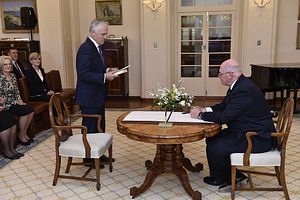After an intraparty leadership contest on Monday, Australia has a new prime minister, Malcolm Turnbull, the former environmental minister, communications minister, and leader of the Liberal Party. Turnbull’s ascension to the prime minister’s job was not unexpected, as this was the second intraparty leadership challenge this year in the governing coalition. The Wall Street Journal reported that, before the intraparty leadership contest, surveys of Australian voters “pointed to defeat for the ruling Liberal-National coalition at federal elections due next year.” Leadership contests between elections have become common for both major parties, adding to instability in Australian politics.
In the weeks following the leadership contest, Turnbull likely will seek to emphasize continuity with many of former Prime Minister Tony Abbott’s policies, even though he had dissented in the past on a range of issues including same-sex marriage, climate change, and others. But before Australia’s next election in 2016, Turnbull may indeed move his coalition slightly closer to the center of Australian politics, a shift that will be necessary to win in 2016. For one, Turnbull does seem committed to addressing climate change through emissions trading, investing in renewable energy, and, potentially, larger cuts in carbon emissions that the Liberal-National government has announced. (Turnbull once openly mocked the former prime minister’s climate change strategy.) Turnbull previously had to renounce his relatively centrist position on climate change in order to mollify supporters within his coalition, but in the run-up to a general election, he could push the coalition to adopt a more aggressive climate change policy.
On regional diplomacy, Turnbull is likely to push forward closer ties with Indonesia; Australia-Indonesia relations are just now recovering from the diplomatic break following the execution of Australian drug traffickers in Indonesia in April. Australia also is highly likely to rejoin the naval exercises led by the United States and India known as Exercise Malabar. Australia originally joined the exercises but pulled out nearly a decade ago after China expressed anger at what Beijing perceived a growing containment strategy by the United States and its partners in Asia.
On immigration, Turnbull is unlikely to prove much different than Abbott, whose hard line on refugees was relatively popular with the Australian public. Australia’s tough refugee strategies—which include processing refugees offshore including on islands in the Pacific and turning back boats of refugees—have been described as a “failure to respect rights of asylum seekers and refugees” by Human Rights Watch. Some of the strategies also do not appear to have worked; a plan to pay Cambodia to take refugees already appears to be stumbling, as the first group of refugees transferred to Cambodia is already trying to leave that country. Yet Turnbull, who in the past has argued for taking in more Syrian minorities and other endangered refugee groups, is unlikely to abandon a policy that polls well with the public before an election. (Australia has agreed to a small increase in the number of Syrian refugees it is willing to take in.)
































